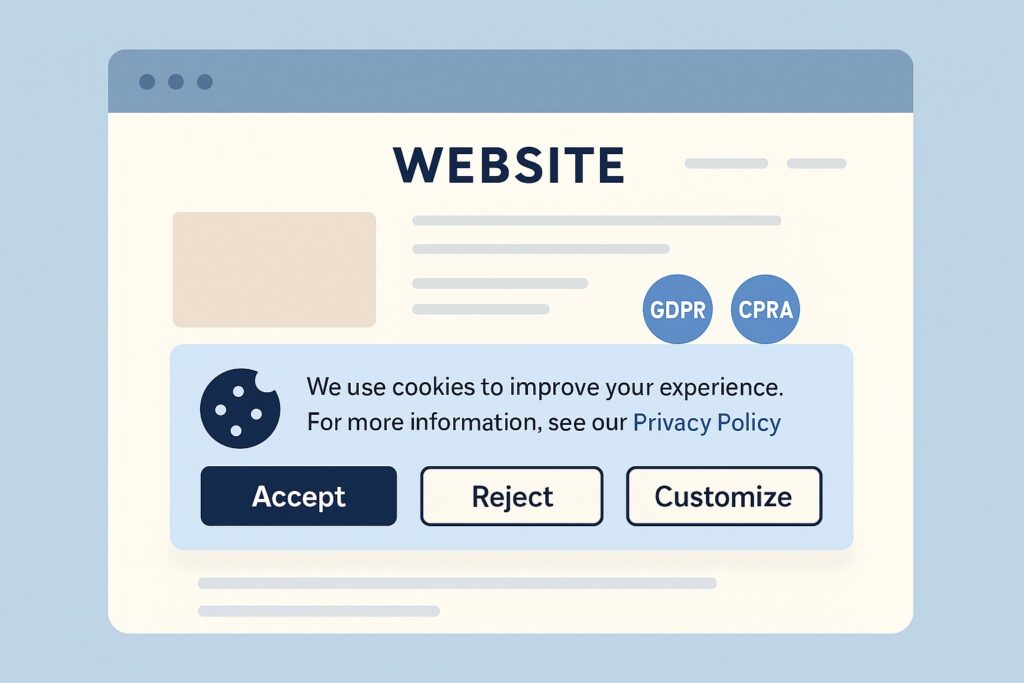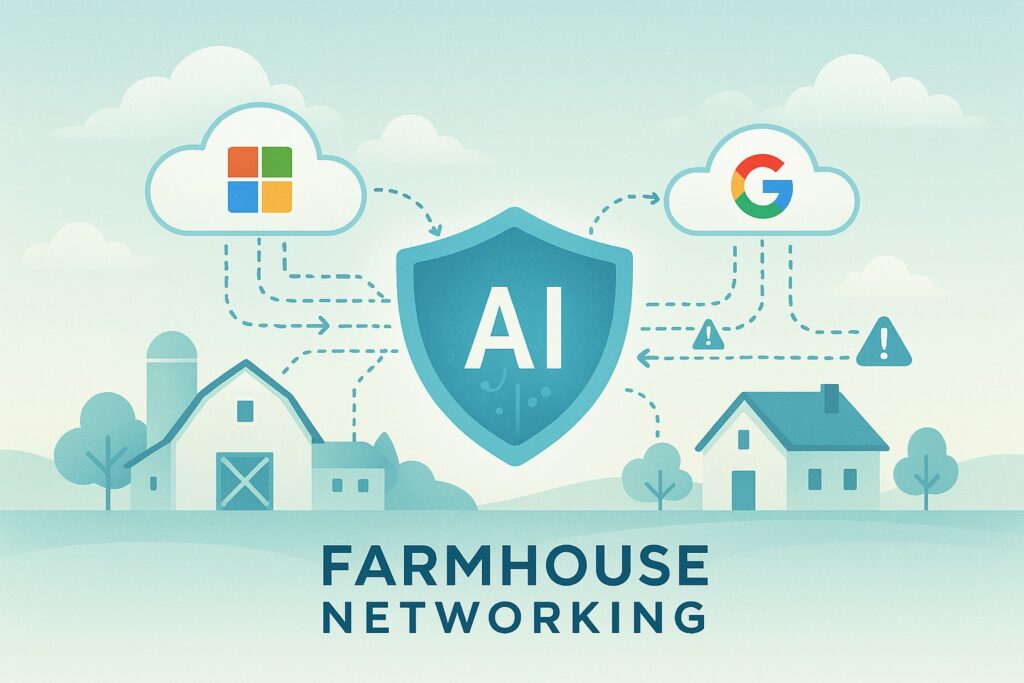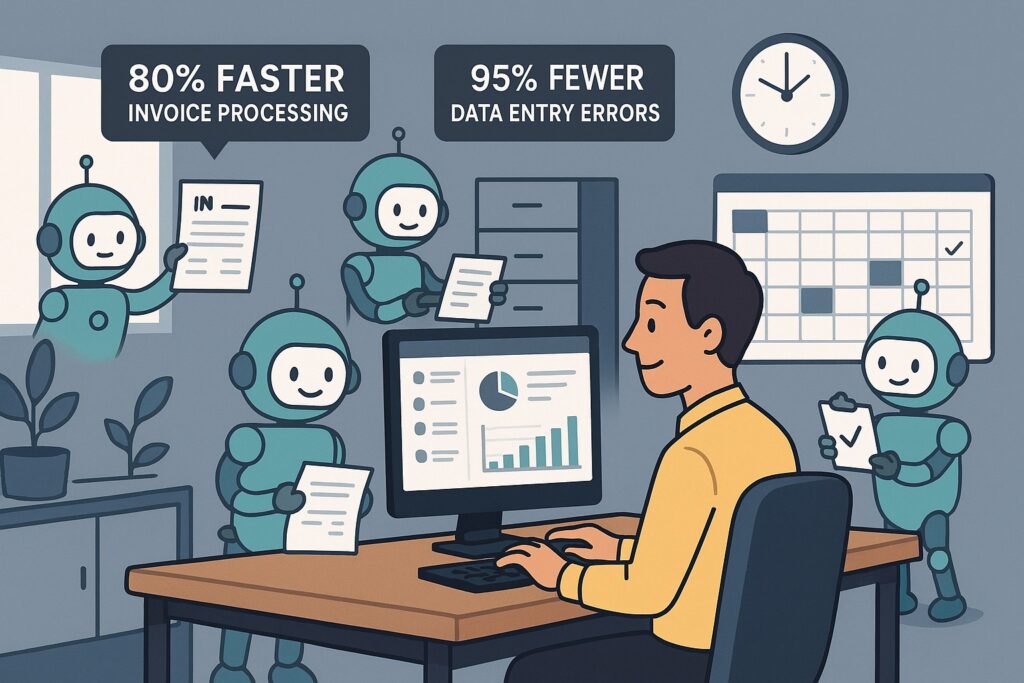Tech Blog
Recent Posts
- FinCEN Eases Due Diligence: A Practical Guide for Small Business Owners February 20, 2026
- Online AI Assistants Are Powerful—and Dangerous. Here’s How to Use Them Safely in Your Business February 13, 2026
- 2026 Charitable Giving Shake‑Up: What Every Small Business Owner Needs to Change February 6, 2026
- February 16, 2026 and Beyond: Why Every Small Business Website Needs a Real Privacy Policy January 30, 2026
- 2026 CFO Tech Priorities: What Every Business Owner Needs to Do Now January 23, 2026
Archives
- February 2026 (3)
- January 2026 (5)
- December 2025 (4)
- November 2025 (4)
- October 2025 (6)
- September 2025 (3)
- August 2025 (5)
- July 2025 (4)
- June 2025 (4)
- May 2025 (5)
- April 2025 (4)
- March 2025 (3)
- February 2025 (4)
- January 2025 (4)
- December 2024 (6)
- November 2024 (5)
- October 2024 (3)
- September 2024 (5)
- August 2024 (5)
- July 2024 (4)
- June 2024 (5)
- May 2024 (4)
- April 2024 (6)
- March 2024 (3)
- February 2024 (4)
- January 2024 (6)
- December 2023 (5)
- November 2023 (4)
- October 2023 (7)
- September 2023 (6)
- August 2023 (7)
- July 2023 (4)
- June 2023 (6)
- May 2023 (3)
- April 2023 (2)
- March 2023 (3)
- February 2023 (8)
- January 2023 (2)
- December 2022 (5)
- November 2022 (1)
- October 2022 (1)
- September 2022 (1)
- August 2022 (2)
- July 2022 (2)
- June 2022 (1)
- May 2022 (2)
- April 2022 (1)
- March 2022 (1)
- February 2022 (1)
- January 2022 (1)
- December 2021 (2)
- November 2021 (9)
- October 2021 (10)
- September 2021 (9)
- August 2021 (8)
- July 2021 (5)
- June 2021 (4)
- May 2021 (2)
- April 2021 (9)
- March 2021 (10)
- February 2021 (9)
- January 2021 (8)
- December 2020 (11)
- November 2020 (6)
- October 2020 (9)
- September 2020 (6)
- August 2020 (7)
- July 2020 (10)
- June 2020 (8)
- May 2020 (8)
- April 2020 (8)
- March 2020 (8)
- February 2020 (7)
- January 2020 (5)
- December 2019 (2)
- November 2019 (6)
- October 2019 (2)
- September 2019 (1)
- August 2019 (4)
- July 2019 (5)
- June 2019 (2)
- April 2019 (1)
- March 2019 (4)
- February 2019 (3)
- January 2019 (3)
- December 2018 (4)
- November 2018 (1)
- October 2018 (5)
- September 2018 (3)
- August 2018 (1)
- July 2018 (2)
- June 2018 (3)
- April 2018 (6)
- March 2018 (2)
- February 2018 (1)
- January 2018 (1)
- December 2017 (3)
- November 2017 (2)
- October 2017 (3)
- September 2017 (2)
- August 2017 (2)
- July 2017 (1)
- June 2017 (3)
- May 2017 (2)
- April 2017 (2)
- March 2017 (2)
- February 2017 (4)
- January 2017 (2)
- November 2016 (2)
- October 2016 (2)
- September 2016 (2)
- August 2016 (3)
- July 2016 (3)
- June 2016 (5)
- May 2016 (2)
- April 2016 (4)
- March 2016 (11)
- February 2016 (8)
- January 2016 (4)
- December 2015 (4)
- November 2015 (2)
- October 2015 (8)
- September 2015 (8)
- August 2015 (8)
- July 2015 (5)
- March 2015 (2)
Categories
- Access Management Solutions (2)
- Accounting (1)
- Active Directory (27)
- Adobe Cloud (2)
- AI for Small Business (4)
- AI Security for Small Business (1)
- Amazon (8)
- Apple iOS (13)
- Artificial Intelligence (17)
- Audit Logging (9)
- Automation (18)
- Azure (13)
- Azure Rights Management (2)
- Backup and Restore Solutions (2)
- Battery Backup (2)
- Best Practices (8)
- Bring Your Own Device (BYOD) (54)
- Budget Talk (10)
- Business Automation (2)
- Business Continuity & Resilience (3)
- Business Efficiency Tools (1)
- Business Strategy & Planning (5)
- Cabling (2)
- Calendar (6)
- Certificates (6)
- Charitable Giving & Philanthropy (1)
- Cisco (8)
- Cloud & Browser Management (1)
- Cloud Security & Compliance (1)
- Cloud Services (115)
- CMMC Assessment & Gap Analysis (1)
- CMMC Certification (7)
- CMMC Certification Costs (1)
- CMMC Level 2 Compliance Guide (1)
- Co-Managed IT (154)
- Compliance (123)
- Computer Repair (1)
- Copilot (1)
- cPanel (2)
- Cyber Security Training (19)
- Cybersecurity for Small Business (25)
- Daily Inspiration (34)
- Data Analytics (3)
- Data Privacy (3)
- Data Protection (7)
- Data Security (4)
- Disaster Preparedness (85)
- Distributed File Services (DFS) (1)
- DNS Filtering (13)
- DoD CMMC Budget Planning (1)
- Domain Controller (7)
- Domain Name Services (DNS) (5)
- Dynamic Host Configuration Protocol (DHCP) (4)
- Email (43)
- Email Security Solutions (3)
- Employee Security Awareness & Training (2)
- Encrypted Email (8)
- Encryption (15)
- Endpoint Detection & Response (EDR) (1)
- Endpoint Security for Small Business (2)
- Enhanced Detection & Response (16)
- ePHI Safeguards and Encryption (1)
- Event Logs (6)
- Exchange (14)
- FAR (1)
- File Sync & Share (8)
- Folder Redirection (3)
- Freelance (4)
- Glacier Storage (5)
- Gmail (5)
- Google Android (13)
- Google Apps (19)
- Google Chrome (1)
- Government Contractor Cybersecurity (1)
- Group Policy (15)
- Help Desk (27)
- HIPAA Compliance for Healthcare (35)
- HIPAA Risk Assessments & Audits (1)
- Hosted Email (12)
- Hosted PBX (6)
- Hyper-V (1)
- Hyperconvergence (2)
- Industry 4.0 (4)
- Information Security Strategies (4)
- Internet (37)
- Internet of Things (4)
- IT Asset Management (1)
- IT Cost Management (1)
- IT Infrastructure for SMBs (2)
- IT Strategy & Outsourcing (4)
- Juniper (4)
- LDAP (3)
- Leadership & Technology Decisions (1)
- Lifecycle Management (2)
- Linux (2)
- MacOS X (1)
- Maintenance (59)
- Managed Antivirus (20)
- Managed EDR (1)
- Managed IT Security Services (1)
- Managed IT Services (5)
- Microsoft Edge (1)
- Microsoft Office (4)
- Mobile (11)
- Mobile Device Management (MDM) (15)
- Monitoring (13)
- Nagios Core (2)
- Network Attached Storage (NAS) (9)
- Network Firewall for Business (1)
- Network Management for SMBs (3)
- Network Policy Server (5)
- Network Security (150)
- Networking (58)
- NIST Security Framework for SMBs (10)
- Office 365 (57)
- Offline Files (1)
- OneDrive for Business (2)
- Online Backup (34)
- Outlook (9)
- Password Management (25)
- Password Policy (2)
- PCI DSS (25)
- Penetration Testing (4)
- Phishing (18)
- Power Protection (11)
- PowerShell (20)
- PPPoE Router Configuration (2)
- Printer (12)
- Productivity & Workplace Tools (1)
- Quickbooks (6)
- Quotes (8)
- RADIUS (5)
- Ransomware (3)
- Registry (6)
- Remote Access (11)
- Resources (15)
- RingCentral (3)
- Risk Management for Businesses (4)
- RMM (23)
- Routing (17)
- S3 Storage (6)
- Sage 50 Accounting (Peachtree) (3)
- Scale Business (1)
- Scripts (8)
- Servers (95)
- Sharepoint Online (2)
- Single Sign-On (2)
- Small Business Finance (1)
- Small Business IT Optimization (1)
- Small Business Tax & Compliance (1)
- SMB Budget Optimization (1)
- SMB Data Recovery (1)
- SMB Digital Transformation (2)
- SMTP (4)
- SNMP (1)
- Software (35)
- Software as a Service (SaaS) (28)
- Software Asset Management (1)
- Solarwinds (1)
- Sophos (1)
- SPAM (8)
- Status (6)
- StoneEdge (1)
- Storage (30)
- Synology (8)
- Synology Active Backup (4)
- Teams (3)
- Technology As A Service (TaaS) (27)
- Terminal Server (13)
- Threat Detection & Incident Response (50)
- Tier 3 IT Support (142)
- Troubleshooting (43)
- Ubiquiti (6)
- Uncategorized (159)
- Updates (20)
- User Access & Privilege Management (1)
- Video Conferencing (1)
- Virus Infection (25)
- VOIP (25)
- VPN (26)
- Vulnerability Management (2)
- Web Browser Security (1)
- Website Hosting (10)
- Website Management & Security (1)
- WHM (3)
- Windows 10 (8)
- Windows Phone (6)
- Windows Server Backup (6)
- Wireless (19)
- Wordpress (2)
- Workflow Automation (1)
- Workstations (86)
- Zero Trust (9)
- Zoom (1)









